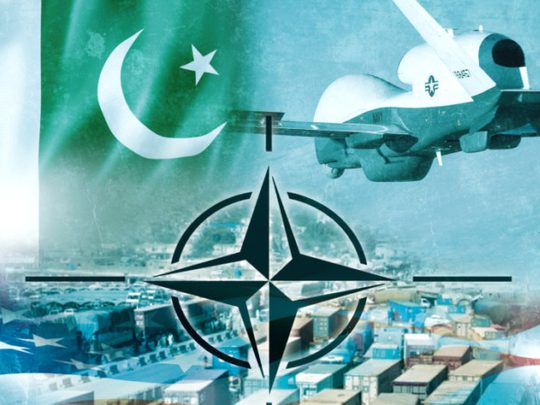
Despite Pakistan being a large country of more than 180 million resilient and hard-working people, international perceptions focus on problem areas occasionally arising elsewhere, missing the big picture. Right now, attention “front and centre” is focused on the blockade of Nato supplies exiting Pakistan for Afghanistan, imposed by Imran Khan’s Pakistan Tehreek-e-Insaf (PTI) party which governs the Khyber Pakhtunkhwa (KPK) province. This is to express opposition to the US drone strikes periodically targeting the Federally Administered Tribal Areas (Fata) sandwiched between Afghanistan and KPK.
There is concern regarding the implications of this development. How much will it affect the overall withdrawal of the US and its Nato allies? What is the position of the federal government on the blockade and on the drone strikes themselves? How will this affect relations with the US and the other affected Nato allies who constitute almost the entire western bloc? How does Pakistan’s policy on drones impact counter-terrorism cooperation with the US?
The situation is not as stark as it seems: One has to zoom out to see the actual situation. The American/Nato logistics lifeline for Afghanistan, the ground lines of communication (GLOC), rely mainly on transiting Pakistan. Other routes via the Central Asian Republics are also in use though less cost-effective. But even through Pakistan there are two routes. The northern route through Torkham in KPK and the southern through Chaman in Balochistan, both accessing the port city of Karachi. The northern route has been impacted but the southern continues. The KPK route carries the bulk of Nato supplies, material and equipment and a portion of the American forces. The Balochistan route is mainly used for American material and in a smaller proportion by British troops. Highway 1 linking Kabul to Kandahar, next to the Chaman exit is doable, but can take upto 10 hours traversing sometimes hostile territory — though that is a common problem throughout the country.
The government is clear that the agreement to allow Nato to use both routes must be honoured. Voices have also been raised that the PTI in this democratic dispensation should take the issue to parliament rather than utilising its supporters for carrying out actions that will not deter drone strikes. On the contrary, facilitating American withdrawal from Afghanistan, a common political and public objective in Pakistan, will decrease drone strikes as their continued positioning in Afghanistan will become more problematic. The blockade is also hurting the KPK economy and the massive fleet of transporters who come mainly from that area.
Significant portions of the development budgets of both KPK and Fata rely on aid from the US and its Nato allies. There has been criticism that a more principled KPK provincial government should refuse such assistance and demand in parliament that Pakistan do the same — forcing it to stand on its own feet and accept the austerity, budget and development cuts that will ensue.
The Pakistan Muslim League (PML) government of Prime Minister Nawaz Sharif has maintained a strong and consistent position of opposition to drone strikes as a violation of Pakistan’s sovereignty and also counterproductive to the common efforts of both countries to fight terrorism. This has been conveyed to the US government at every level and reiterated after every drone strike. The currents of international laws are increasingly questioning the legality of drone strikes.
How, therefore, is the blockade and government position on drone strikes affecting bilateral relations, including the priority area of counterterrorism cooperation? After the elections, the prime minister was lauded for supporting PTI to form the provincial KPK government rather than manoeuvre a PML-led coalition. There are thus limits to federal government action beyond persuasion. The Americans are well aware of this. Counter-terrorism cooperation is close with institutional and operational linkages.
The backdrop is the now positive trajectory of Pakistan-US relations. For years, the overriding American complaint was that Pakistan “must do more” to support its unpopular occupation of Afghanistan. This culminated in November 2011 when 24 Pakistani troops on the Pakistan-Afghanistan border at Salala were killed by American/Nato airstrikes. Pakistan suspended all transit facilities for Nato for seven months until the US adequately apologised.
The resultant soul-searching, coupled with the imminence of the US withdrawal from Afghanistan, led to a more realistic understanding of what Pakistan had contributed; at what cost to its military, its economy — far beyond the aid received from America — and its people, reeling from the extremist and terrorist forces unleashed by the Afghan occupation. And of the key role that Pakistan, a neighbour with a 2,565km common border, could play in facilitating a peaceful resolution in Afghanistan.
Since then, within the framework of a resumed multi-sectoral high-level strategic dialogue, bilateral relations have been better than at any time in the preceding five years. Although contrary to media reports, visiting US Defence Secretary Chuck Hagel did not say so in meetings with Pakistan’s civil and military notables, if all US/Nato transit through Pakistan was interdicted, Congressional conditionalities would begin to circumscribe all forms of US financial flows to Pakistan, both civilian and military.
Such a situation has not been reached and both sides realise that the reinvigorated bilateral relationship holds considerable promise for strengthening the democratic order in Pakistan, a sounder economy, the Afghan transition and a reduction of tension in South Asia, given Sharif’s priority of fostering much better relations with India as well as with Afghanistan.
Ambassador Tariq Osman Hyder is a retired Pakistani diplomat.











